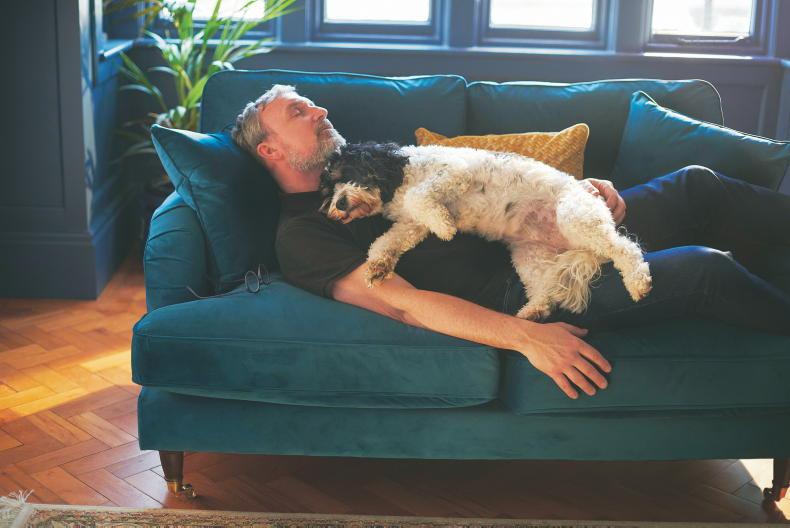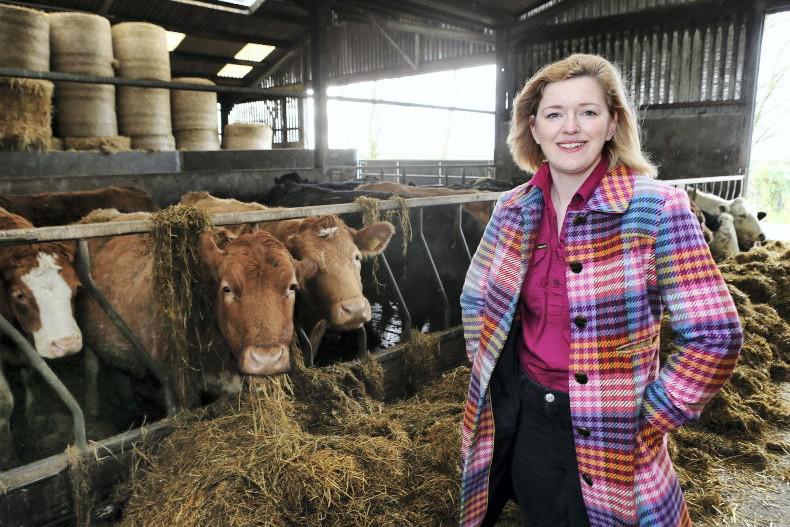Suzanne Horgan has never been as busy in 22 years. The psychotherapist and trainer behind eatingdisorders.ie has been working flat out since March 2020 to help people deal with food issues as a result of the pandemic, she says.
With everyone knocked out of their normal routine, eating too much became very common for many.
“Sometimes it was just for comfort and sometimes just for the sake of it and sometimes it was environmental. Many were home schooling and working from home where they were literally surrounded by food. More just got bored or thought ‘what the hell’. They weren’t seeing people so they let themselves go a bit.”
Emotional eating also happened because of old, negative thoughts and memories coming up, she adds. No longer distracted by day-to-day running around, negative thoughts often became more intrusive.
“They couldn’t be suppressed on a day-to-day basis like they usually were and food was used to try and change or manage those feelings.”
Tension relieved by eating
She points out that emotional eating is a complex subject and that thoughts create how we feel and feelings create what we do.
“Sometimes the person doesn’t know what they are feeling but they experience tension in their body and they know that this tension will be relieved when they eat so they eat more because these feelings have come up.”
Fear has also been a factor during the pandemic – fear of getting the virus or of losing one’s job, for example.
“Fear creates a lot of stress and negative energy and anxiety may lead to a lot of nibbling and grazing and the need for comfort. The food will comfort that, but even though it is a short term solving of the problem, you are creating a bigger long term problem for yourself.”
However, many of us are already emotional eaters at heart, she says.
“We eat because we are celebrating, or commiserating, or because we’re bored or lonely, but when our eating patterns have an adverse impact on our lives we need to look at ‘what, in fact, is eating us?’
*According to the University College Dublin National COVID-19 Food Study
Emotional v physical hunger
So how do you know when you are emotionally hungry?
There are distinct differences between a physical cue for hunger from the body and an emotional cue for hunger.
Physical hunger:
Starts in the stomach.Is very gradual.Does not have to be for a specific food.Individual tends to eat when they are hungry and stop when they are full.
Emotional hunger:
Starts in the mouth or head.It’s very quick.Usually about a specific food.Individual doesn’t usually stop when they feel full, if in fact they don’t get to feel full at all.Individuals tend to feel guilty after eating.Emotional eaters tend to eat to:
Hide or cope with negative or bad feelings.Feed a hungry heart (the heart is hungry craving love, whether it is self-love or love from someone else, but that hunger is translated into ‘I need food’ so the person will then eat to feed that hunger. The analogy is that we fill the emptiness with food.)Deal with self-abuse.Deal with trauma.Deal with boredom, anxiety, loneliness, fear, loss etc.Tips to break the habit of pandemic
So – what to do? Here are Suzanne’s 10 tips to break the habit:
1 Become aware of the different feelings you are responding to and that have created your overeating patterns. Keep a journal to help you do this. Start to observe what’s going on. It should be neutral observation, not judgmental observation. Look at what happened before the eating. What was the behaviour chain? Did someone say something and you thought something and then you felt bad? Becoming aware is about trying to intercept all that so that the outcome is different, ie you don’t overeat. Identify and acknowledge what’s going on and then find a different way of responding to it, one that doesn’t involve food, alcohol, drugs or gambling or whatever you are doing to manage your feelings.
2 Acknowledge that it is OK to be anxious or fearful but that it also doesn’t mean something bad is going to happen. Learn to respond differently to the feeling.
3 Be aware of your triggers. Once you have identified the feelings that you are eating in response to, you can become aware of the triggers that are maintaining your emotional eating. It could be a situation, a thought, an image, the media, stress, trying on clothes etc.
4 See the world through unwounded eyes. We all have a past and it’s like a bottomless pit and things that shouldn’t have happened happened and things that should have happened didn’t, so if you’re eating in response to the wounds of the past then it can take a while to change your habits. But if you instead start looking at the world from unwounded eyes this will then change your reaction to those wounds and your behaviours with food, alcohol or smoking or whatever you are doing. What we want to do is help the person not see themselves as a bad person because of what may have happened in the past.
5 Separate feeling from fact. The biggest thing to remember is that “a feeling is a feeling, not a fact”. I can feel stupid and boring and that nobody likes me, but that doesn’t mean that is true – feeling, not fact. Separating feelings from facts can be really helpful because you are then less likely to get consumed by the feeling. You can say “that doesn’t mean that I am”. That can be a huge step forward.
6 Ask yourself what other way could I manage/express/handle/tolerate a feeling? Find some other way to take the pain away. This involves letting the feeling be there and not getting consumed by it.
7 Stop judging yourself for feeling what you are feeling. Allow yourself to feel your feelings and just accept that we have such feelings. In many cases it is our attempt not to feel the feeling rather than the feeling itself that causes resistance, which results in emotional eating.
8 Think of the health benefits. When the urge to overeat comes, think: “What I want more is to be healthy and to regulate my feelings and to not eat foods that are not going to be healthy for me.”
9 Out of sight out of mind. If the food isn’t there you won’t eat it. Yes, you can still drive to a shop, but it’s an effort the person has to make. Create an optimal environment for success by clearing out cupboards and having the healthiest food possible at home. We need balance and play foods for the soul, however. The 80:20 rule is a good one – 80% healthy food, 20% less healthy.
10 Develop skills to help you. Sometimes a person is missing a skill that, if developed, would help the need for emotional eating to subside. Solve the problem with the person rather than pushing down the pain that the problem is causing. Sometimes it’s communication; we need to communicate our needs to a person, but we are not doing that so our needs are not being met, so we feel the urge to eat. Sometimes it’s literally not planning ahead. If you fail to plan, you plan to fail.
Some skill sets that may be needed to combat emotional eating include:
Anxiety reduction.Assertiveness.Communication.Confrontational.Flexibility.Mindfulness – you can’t overeat when you’re eating mindfully. It’s a fabulous exercise to try and regulate one’s eating. Planning.Problem-solving.Relaxation.Self-compassion.Self-soothing.Stimulus control (managing food in your environment).Social.Stress management.Time management.Good news about cravings
Cravings pass. Feelings will rise and fall if you leave them alone. If you go into your head and tell yourself a story about a feeling, however, this means you are generating more negative energy around it. It’s like you’re holding on to it. It’s the same as trying to resist a cigarette. It’s the resistance that people usually end up eating in response to as opposed to the actual feeling.
Identify, acknowledge, accept and express your feelings in a way that honours you and your body. This will change the need to emotionally eat. Find another way to manage your feelings.
Goal - to be able to manage, tolerate and handle negative feelings.
Remember - in any given moment we don’t get to choose how we feel, but we do get to choose how we react or how we respond or how we act while experiencing that feeling.
If you have been affected by the issues raised in this article or feel you might need some help there are some resources out there to help you.
Book: 50 Ways To Soothe Yourself Without Food by Susan Albers.
Websites: www.eatingdisorders.ie | Bodywhys.ie | www.overeatersanonymous.ie | www.hse.ie/eng/about/who/cspd/ncps/mental-health/eating-disorders/
Read more
Acne: treat sooner rather than later
Salt: think about shaking the habit
Suzanne Horgan has never been as busy in 22 years. The psychotherapist and trainer behind eatingdisorders.ie has been working flat out since March 2020 to help people deal with food issues as a result of the pandemic, she says.
With everyone knocked out of their normal routine, eating too much became very common for many.
“Sometimes it was just for comfort and sometimes just for the sake of it and sometimes it was environmental. Many were home schooling and working from home where they were literally surrounded by food. More just got bored or thought ‘what the hell’. They weren’t seeing people so they let themselves go a bit.”
Emotional eating also happened because of old, negative thoughts and memories coming up, she adds. No longer distracted by day-to-day running around, negative thoughts often became more intrusive.
“They couldn’t be suppressed on a day-to-day basis like they usually were and food was used to try and change or manage those feelings.”
Tension relieved by eating
She points out that emotional eating is a complex subject and that thoughts create how we feel and feelings create what we do.
“Sometimes the person doesn’t know what they are feeling but they experience tension in their body and they know that this tension will be relieved when they eat so they eat more because these feelings have come up.”
Fear has also been a factor during the pandemic – fear of getting the virus or of losing one’s job, for example.
“Fear creates a lot of stress and negative energy and anxiety may lead to a lot of nibbling and grazing and the need for comfort. The food will comfort that, but even though it is a short term solving of the problem, you are creating a bigger long term problem for yourself.”
However, many of us are already emotional eaters at heart, she says.
“We eat because we are celebrating, or commiserating, or because we’re bored or lonely, but when our eating patterns have an adverse impact on our lives we need to look at ‘what, in fact, is eating us?’
*According to the University College Dublin National COVID-19 Food Study
Emotional v physical hunger
So how do you know when you are emotionally hungry?
There are distinct differences between a physical cue for hunger from the body and an emotional cue for hunger.
Physical hunger:
Starts in the stomach.Is very gradual.Does not have to be for a specific food.Individual tends to eat when they are hungry and stop when they are full.
Emotional hunger:
Starts in the mouth or head.It’s very quick.Usually about a specific food.Individual doesn’t usually stop when they feel full, if in fact they don’t get to feel full at all.Individuals tend to feel guilty after eating.Emotional eaters tend to eat to:
Hide or cope with negative or bad feelings.Feed a hungry heart (the heart is hungry craving love, whether it is self-love or love from someone else, but that hunger is translated into ‘I need food’ so the person will then eat to feed that hunger. The analogy is that we fill the emptiness with food.)Deal with self-abuse.Deal with trauma.Deal with boredom, anxiety, loneliness, fear, loss etc.Tips to break the habit of pandemic
So – what to do? Here are Suzanne’s 10 tips to break the habit:
1 Become aware of the different feelings you are responding to and that have created your overeating patterns. Keep a journal to help you do this. Start to observe what’s going on. It should be neutral observation, not judgmental observation. Look at what happened before the eating. What was the behaviour chain? Did someone say something and you thought something and then you felt bad? Becoming aware is about trying to intercept all that so that the outcome is different, ie you don’t overeat. Identify and acknowledge what’s going on and then find a different way of responding to it, one that doesn’t involve food, alcohol, drugs or gambling or whatever you are doing to manage your feelings.
2 Acknowledge that it is OK to be anxious or fearful but that it also doesn’t mean something bad is going to happen. Learn to respond differently to the feeling.
3 Be aware of your triggers. Once you have identified the feelings that you are eating in response to, you can become aware of the triggers that are maintaining your emotional eating. It could be a situation, a thought, an image, the media, stress, trying on clothes etc.
4 See the world through unwounded eyes. We all have a past and it’s like a bottomless pit and things that shouldn’t have happened happened and things that should have happened didn’t, so if you’re eating in response to the wounds of the past then it can take a while to change your habits. But if you instead start looking at the world from unwounded eyes this will then change your reaction to those wounds and your behaviours with food, alcohol or smoking or whatever you are doing. What we want to do is help the person not see themselves as a bad person because of what may have happened in the past.
5 Separate feeling from fact. The biggest thing to remember is that “a feeling is a feeling, not a fact”. I can feel stupid and boring and that nobody likes me, but that doesn’t mean that is true – feeling, not fact. Separating feelings from facts can be really helpful because you are then less likely to get consumed by the feeling. You can say “that doesn’t mean that I am”. That can be a huge step forward.
6 Ask yourself what other way could I manage/express/handle/tolerate a feeling? Find some other way to take the pain away. This involves letting the feeling be there and not getting consumed by it.
7 Stop judging yourself for feeling what you are feeling. Allow yourself to feel your feelings and just accept that we have such feelings. In many cases it is our attempt not to feel the feeling rather than the feeling itself that causes resistance, which results in emotional eating.
8 Think of the health benefits. When the urge to overeat comes, think: “What I want more is to be healthy and to regulate my feelings and to not eat foods that are not going to be healthy for me.”
9 Out of sight out of mind. If the food isn’t there you won’t eat it. Yes, you can still drive to a shop, but it’s an effort the person has to make. Create an optimal environment for success by clearing out cupboards and having the healthiest food possible at home. We need balance and play foods for the soul, however. The 80:20 rule is a good one – 80% healthy food, 20% less healthy.
10 Develop skills to help you. Sometimes a person is missing a skill that, if developed, would help the need for emotional eating to subside. Solve the problem with the person rather than pushing down the pain that the problem is causing. Sometimes it’s communication; we need to communicate our needs to a person, but we are not doing that so our needs are not being met, so we feel the urge to eat. Sometimes it’s literally not planning ahead. If you fail to plan, you plan to fail.
Some skill sets that may be needed to combat emotional eating include:
Anxiety reduction.Assertiveness.Communication.Confrontational.Flexibility.Mindfulness – you can’t overeat when you’re eating mindfully. It’s a fabulous exercise to try and regulate one’s eating. Planning.Problem-solving.Relaxation.Self-compassion.Self-soothing.Stimulus control (managing food in your environment).Social.Stress management.Time management.Good news about cravings
Cravings pass. Feelings will rise and fall if you leave them alone. If you go into your head and tell yourself a story about a feeling, however, this means you are generating more negative energy around it. It’s like you’re holding on to it. It’s the same as trying to resist a cigarette. It’s the resistance that people usually end up eating in response to as opposed to the actual feeling.
Identify, acknowledge, accept and express your feelings in a way that honours you and your body. This will change the need to emotionally eat. Find another way to manage your feelings.
Goal - to be able to manage, tolerate and handle negative feelings.
Remember - in any given moment we don’t get to choose how we feel, but we do get to choose how we react or how we respond or how we act while experiencing that feeling.
If you have been affected by the issues raised in this article or feel you might need some help there are some resources out there to help you.
Book: 50 Ways To Soothe Yourself Without Food by Susan Albers.
Websites: www.eatingdisorders.ie | Bodywhys.ie | www.overeatersanonymous.ie | www.hse.ie/eng/about/who/cspd/ncps/mental-health/eating-disorders/
Read more
Acne: treat sooner rather than later
Salt: think about shaking the habit









SHARING OPTIONS